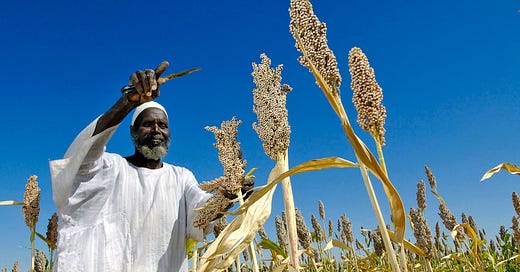Special Edition: Unearthing the Crises and Opportunities in African Agriculture
Dear all,
In this special edition of ESG on Sunday, we dive into the impact of food waste on the African continent and climate change. Europe’s future is, in so many ways and dimensions, tied to the future of Africa. Africa had to import $43 billion worth of food in 2019, according to World Bank estimates. That figure is set to rise to $110 billion by 2025, it predicts. This is an enormous increase. On the other hand, however, Africa could be a food exporter in the very near future. Africa has been a major crop exporter before; in the 1960s, as European colonial powers gradually withdrew, the continent churned out much of the world’s cocoa, coffee, and palm oil. But since then, times have changed.
Farm productivity hasn’t improved in many parts of Africa for 100 years
Economic loss due to climate change will be significant in the long term in developing countries. Although there are varied perspectives on the effects of climate change on economic growth, the balance of evidence indicates that economic growth will decline more in developing countries, particularly in Africa, and in the long term. For Africa, studies have suggested moderate economic loss in the medium term, before 2050, but beyond this period, economic loss due to climate change will increase.
The literature has suggested a mean decline of 7.12 percent of GDP in the long term. Even within Africa, the most vulnerable subregions and countries will be disproportionately affected. Western and Eastern Africa will suffer the most due to global warming. Country-level projections have suggested much greater economic losses, ranging from –11.2 percent to –26.6 percent of GDP in the long term, in the most affected regions of Africa. While at the global level, negative effects from warming become more pronounced at around 2 degrees Celsius, smaller temperature increases could cause significant negative impacts on socioeconomic indicators in developing regions, including Africa.
The spatial and temporal variations in the evidence indicate the need to consider the local context when developing climate adaptation and mitigation interventions. Regional studies in Africa and Central and South America have suggested an extremely large reduction in agricultural/crop production yield. In Africa, it ranges from –2.9 percent in 2030 to –18 percent in 2050. However, rainfed crops will suffer the most, with irrigated crops proving to be more resilient to climate change (but still only partially). Climate change is expected to reduce the value of farmland in Africa in the long term by 36 to 61 percent. With declining crop yields due to climate change, a significant number of people in Africa will be at risk of severe hunger, malnutrition, and undernourishment.
In Africa, more than 200 million people risk suffering from extreme hunger in the long term. These are some of the facts and some of the consequences. However, let's try to understand how things could change in Africa and what is needed for it!
Keep reading with a 7-day free trial
Subscribe to ESG on a Sunday to keep reading this post and get 7 days of free access to the full post archives.



